CALCIUM CARBONATE + VITAMIN D3 + BACILLUS CLAUSII
Calcium Carbonate: Calcium carbonate is a commonly used mineral supplement and antacid. It is most commonly used to treat symptoms of acid indigestion, heartburn, and upset stomach. Calcium carbonate is also used to prevent or treat calcium deficiency in the body.
The mechanism of action of calcium carbonate is quite simple. When taken orally, it reacts with the acid in the stomach to neutralize excess stomach acid. This action helps to relieve symptoms of acid indigestion and heartburn. Additionally, calcium carbonate provides a source of supplemental calcium for individuals with calcium deficiency.
The dose of calcium carbonate varies depending on the purpose of use. For adults and children over 12 years old, the typical dose for symptoms of acid indigestion or heartburn is 500-1000 mg (2-4 tablets) taken as needed. For calcium supplementation, the recommended daily dose for adults is 1200-1500 mg.
While calcium carbonate is generally considered safe, it can cause some side effects. Common side effects include constipation, gas, and bloating. These side effects are usually mild and go away on their own. If you experience severe or persistent side effects, it is important to seek medical advice.
It is worth noting that calcium carbonate may interact with certain medications, such as antibiotics, thyroid medications, and iron supplements. It is advisable to consult a healthcare professional or pharmacist before starting calcium carbonate if you are taking any other medications.
Overall, calcium carbonate is a widely used medication for the relief of acid indigestion, heartburn, and as a calcium supplement. It is important to follow the recommended dose and be aware of possible side effects or interactions with other medications.
Vitamin D3: Drug: Vitamin D3
Use: Vitamin D3, also known as cholecalciferol, is a form of vitamin D that has several important functions in the body. It is primarily used as a dietary supplement to prevent or treat vitamin D deficiency, which can lead to various health problems. Vitamin D3 is crucial for the absorption and regulation of calcium and phosphorus, two minerals that are necessary for healthy bones, teeth, and muscles. It is also involved in immune function, cardiovascular health, and the modulation of cell growth and differentiation.
Mechanism of Action: Vitamin D3 is inactive when it enters the body. It requires activation by the liver and kidneys before it can be utilized. Once activated, it acts as a hormone, binding to vitamin D receptors in various cells throughout the body. This binding then triggers a series of reactions that regulate the levels of calcium and phosphorus in the bloodstream and promote bone health.
Dose: The recommended daily intake of vitamin D3 varies depending on age, sex, health conditions, and individual needs. Generally, the adequate intake level for adults is around 600-800 international units (IU) per day. However, higher doses may be required for individuals with vitamin D deficiency or specific medical conditions. Higher doses are typically prescribed by healthcare professionals and can range from 1,000 to 10,000 IU per day.
Side Effects: Vitamin D3 is generally safe when taken in recommended doses. However, excessively high doses can lead to vitamin D toxicity, which may cause symptoms such as nausea, vomiting, constipation, loss of appetite, excessive thirst, frequent urination, fatigue, and kidney stones. Prolonged vitamin D toxicity can also lead to hypercalcemia, a condition characterized by high levels of calcium in the blood, which can cause more severe symptoms such as confusion, abnormal heart rhythm, and kidney damage.
It is important to consult with a healthcare professional before taking vitamin D3 supplements, especially if you have any underlying medical conditions or are taking other medications that may interact with vitamin D3.
Bacillus Clausii: Bacillus Clausii is a probiotic drug used primarily to restore the natural balance of gut bacteria. It is commonly prescribed to prevent or treat gastrointestinal disorders such as diarrhea and dysbiosis, which occur due to an imbalance in the intestinal flora.
The mechanism of action of Bacillus Clausii involves the colonization of the gastrointestinal tract by the live bacteria present in the drug. These bacteria help restore the normal flora and enhance the gut’s defense mechanisms against harmful bacteria, viruses, and toxins. Bacillus Clausii produces antimicrobial substances that inhibit the growth of pathogenic microorganisms, promoting the growth of beneficial bacteria.
The recommended dose of Bacillus Clausii varies depending on the age and condition of the individual. Generally, it is available in the form of oral capsules or suspension. The usual dose for adults and children is 2 to 3 billion colony-forming units (CFUs) per day, divided into multiple doses. For infants, the dose may be lower, typically 1 to 2 billion CFUs per day.
Bacillus Clausii is generally well-tolerated, and side effects are minimal. However, some individuals may experience mild gastrointestinal discomfort, such as bloating and flatulence, during the initial days of treatment. Allergic reactions and hypersensitivity to the drug are rare but possible. If any unusual or severe side effects occur, it is recommended to consult a healthcare professional promptly.
It is worth noting that Bacillus Clausii is considered safe for use in pregnant women, breastfeeding mothers, and infants. However, as with any medication, it is essential to consult a healthcare professional before starting treatment, especially in special populations or individuals with specific medical conditions.
Overall, Bacillus Clausii is a commonly prescribed probiotic drug that aids in restoring the natural balance of gut bacteria and helps manage gastrointestinal disorders. It is generally well-tolerated, with minimal side effects, and plays a vital role in promoting digestive health.

